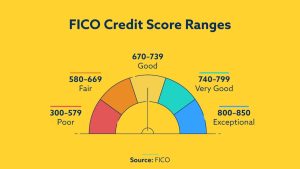How to “Fix” a Bad Credit Score

If you have a credit score that is more toward the lower end, it might create a nuisance for you.
For instance, it can hold you back from getting the things that you want, whether it is renting a new apartment, getting a car, buying your dream home, or more.
It also means that you will be charged higher interest rates if you take loans.
Now, what you need to understand is that improving your score is no easy feat, and it certainly won’t happen overnight. However, the sooner you start taking precautionary steps, the sooner you will be able to reap the perks.
In order to fix bad credit score, you need to grasp the basic concepts first. These include whether you carry your balances on credit cards or whether you pay your bills on time.
With such information, you can easily identify the factors that contribute to a bad score. There are many credit scoring models with various score ranges. However, a credit of 700 or more is considered a good score. At the same time, an 800 or higher score is perceived as excellent.
So, if you have a poor credit score, then continue reading. Below, we have shared expert advice on how you can actually improve it in much less time.
Here is how you can get back into the game:
What Is A Bad Credit Score?
Basically, as per FICO Score, your credit score is a 3-digit number that ranges from 300 to 850. This score is based on the information present in your credit report. It is crucially important for lenders to understand how likely you will repay the money that you are borrowing. A bad score is any number that falls below 670. To help you understand the scoring criteria, we have presented a FICO Score table below. Have a look:

Similarly, the score ranges for VantageScore, a different credit score model proposed by major credit bureaus (Equifax, TransUnion, and Experian), are slightly different. It also ranges from 300 to 850, but the definitions that are associated with each score differ.
How Can I Fix My Credit Score?
Now that you are well-acquainted with what a bad score is, it is only fair if you dive in a bit deeper to understand how you can actually fix it. Here are some tips and tricks that can help you in keeping up your credit score:
Check Your Credit Score And Credit Report
Your credit report carries information regarding how you have used your credit in the last ten years. You have one report at each of the three major credit bureaus, including TransUnion, Equifax, and Experian. Many creditors report to all of these bureaus, but not all, so it is worth reviewing the information on each one of them. This will be of help as you can see all of the accounts in your name and your credit history.
So, if you see a 530 credit score on any report, you can fix it immediately. You can visit Gifted Financial Services to check your reports for free on each of these major bureaus. Along with your credit report, you must also check your credit score. Your reports are what the credit scoring companies use to create your score. It would be perfect for you to check your scores at least once a month.
Always Pay Your Bills On Time
Your payment record makes up about 35 percent of your entire credit score. Therefore, if you are willing to fix your credit score, you must focus on making your monthly payments on time. While it might be no less than a challenge to pay your bills on time, there is a simple hack you can use – autopay.
However, for bills that do not work with autopay, i.e., medical bills, pay them as soon as you get them. If you cannot afford your minimum monthly payment or your current balance, contact the office. In this way, you can come up with a workable payment plan. You can steer clear of overdrawing your account by scheduling your autopay or setting up a budget.
Fix Or Dispute Any Errors
Sadly, credit bureaus sometimes make errors. Due to this, many people suffer as their loans become more expensive. According to the Federal Trade Commission, about one-quarter of people have to face errors in their reports.
If you find any errors on your report, such as an incorrect payment record or accounts that you don’t own, then report them to the credit bureaus ASAP. False information can affect your credit score. Thus, it is critically important to keep track of such activities. There can be a lot of errors on credit reports, such as:
- Inappropriate identity information, such as wrong address, name, or contact number
- Accounts that are not yours having a similar or the same name as you
- Closed accounts, such as car loans or credit cards that are reported as open
- Fraudulent accounts resulting from identity theft
- Duplicate listings of the same debt
- Delinquent status or wrong late on accounts
- False current balance or wrong credit limit
So, the best way to fix credit reports is to look for any errors. If you come across any, it is much easier to dispute them and have them removed.
Pay Down Other Debts
If you have mind-blowing debts, then paying them off can be helpful. It can improve your payment record and reduce your credit utilization ratio. While planning to repay your credit card debt, think about the debt snowball or avalanche method. The snowball method focuses on repaying the minor balances first. On the other hand, the debt avalanche method pays attention to repaying your high-interest cards on priority. If you are planning to repay the loan debt, you might notice a temporary dip in your credit score. But sweat not, as it will improve your credit score over a period of time.
Keep Your Credit Utilization Ratio Below 30%
Your credit utilization ratio is calculated by comparing your overall credit card limit with your card balances. Lenders use this ratio to judge how well you can manage your finances. A ratio of more than 0 percent and less than 30 percent is considered good. So, fixing credit score is the way to get loans easily. The key to maintaining them is to keep your credit utilization limit below 30 percent.
Do Not Take Out Credit Unless You Really Need To
Each time you apply to get credit, your creditor will run a hard credit check on you. This might end up dropping your score by about five points. It will also reduce your average account age, which might lower your score. So, as per a general rule of thumb, do your best to avoid getting credit unless you really require it.
Keep Old Credit Cards Open
You might be interested in closing your old credit card accounts while you have paid them off. But we urge you not to be hasty in doing that. By keeping them open, you can maintain a long credit history, which will make up to 15 percent of your credit score. However, there are a bunch of things to be mindful of here, though. If your card charges an annual fee, then you might consider closing it. Moreover, your issuer might close your card after a certain period of inactivity.
What Affects Credit Scores?
There are a lot of factors that can impact your credit scores. Things such as credit utilization, payment history, recent credit inquiries, and the age of the credit account can all be pivotal parts. The type and amount of debt you have can also affect your scores. It is significant to consider that you can have a number of credit scores. VantageScore and FICO are two of the most popular credit-scoring companies. Each uses its own formulas to calculate scores, so you might see a minor difference between them.
Ultimately, each lender uses its own credit policies. These policies can determine any applicant’s creditworthiness. But, maintaining and building great credit scores might elevate your chances of getting a better interest rate or qualifying for a loan. By responsibly using credit, you are more likely to maintain a 634 credit score or higher. This is not all; you can also improve your scores a lot.
All of this requires doing things such as making on-time and consistent payments, monitoring your balances, and keeping a balanced mixture of credit accounts. You can easily track your credit scores as often as you wish with Gifted Financial Services. Furthermore, you can also use their AI bots to write a follow-up to dispute any errors on your behalf.
Frequently Asked Questions (FAQs)
-
How can I fix my credit score, and how long will it take?
There are many ways to fix your credit score, such as paying down your card balance. However, the outcomes might take much longer than estimated. Sometimes, it can take up to at least a bunch of weeks for creditors to report your payment information. As a result, companies also get delayed in updating your scores because of it. Generally, fixing your score is a long-term but totally worthwhile process.
-
Is a bad credit score permanent?
Below-average scores are often described as bad credit scores, but fortunately, they are not permanent. There are many ways to improve them to exceptional levels.
-
How can I keep my credit score rising high?
One of the best things that you can do to enhance your credit score is to pay your debts right on time. Another thing to consider is to pay them in full if it is feasible. Your payment history can make up a huge chunk of your credit score, so it is important to steer clear of making late payments.
-
Can I ever recover my credit score?
Building great credit takes some time, but it is definitely possible with responsible financial behavior. And there is always time to repair credit score.
-
Can I pay to reset my credit score?
While it might look like a great idea to get someone to fix your credit reports, here is the truth – there is nothing they can do for you that you cannot do yourself. The best part is that you can do all of these things for free. However, if you rely on someone to fix your scores, then you should be ready to invest an arm and a leg.
-
What is an ideal length of credit history?
Individuals with a FICO score that ranges from 800 to 850 had an average credit history span of about 99 to 128 months. This equals around 8 to 11 years. So, it probably makes it an ideal length.
The Bottom Line
And that is it. This was all you need to know about how to fix your credit score. A bad score does not necessarily have to weigh you down. There are some solid actions that you can take right now as well as in the near future that can enhance your scores. Moreover, with these steps, you can also keep your scores as high as possible. Being sure of where you stand and making it a point not to avoid the reality of your credit status are indeed the most significant ongoing strategies. By implementing these strategies, you can significantly enhance your credit. Lastly, you should check your credit score and report regularly. For this, you can use a genuine service, such as Gifted Financial Services. By doing so, you can master your own financial well-being.



